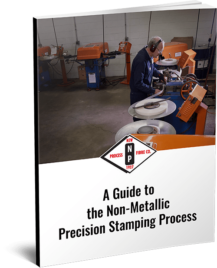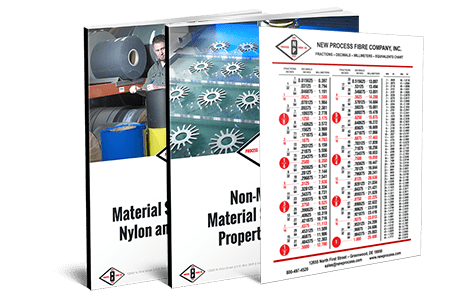Engineers are well aware of the growing need for specialized and custom materials for non-metallic stamping services. As applications become more specialized, so have the materials and configurations available for non-metal stamped products.
With the array of advancements being made across industries, new applications and processes are increasing the demand for alternatives to traditional metal stamped products. Along with this demand comes the need for new materials in fabrication procedures. There are many reasons that engineers are choosing to move away from metals and toward non-metallic stamped components such as thermoplastics, laminates, and fibers.
View Our Stamping ServicesWhat Is Non-Metallic Stamping?
Non-metallic stamping is a process that utilizes a conventional or high speed punch press of varying tonnages and a set of dies to punch a shape from a strip of extruded plastic sheet or other non-metallic materials. Compound dies are composed of two different dies, one that punches out the inside diameter and one that punches out the outside diameter of the piece. These dies allow for plastic stamping to be done in one stroke, and high pressurized air blows away any excess plastic material. The plastic stamping process is commonly used to produce a variety of flat shapes, including washers, gaskets, and other insulators.

Why Use Non-Metallic Stamping?
There are a variety of materials that can be used with non-metallic stamping, and each offer their own set of advantages, including:
- Vulcanized fibre. A light and strong material often made of wood pulp, paper, and rag material that has good impact and abrasion resistance as well as high flammability ratings. Vulcanized fibre is ideal for applications in automotive, electrical, and other industries.
- Laminates are composed of various resins and graded by the National Electrical Manufacturers Association (NEMA) for electrical, mechanical, and chemical performance characteristics. Laminates are ideal for aerospace, automotive, electronics, industrial, and petroleum applications.
- Thermoplastics, including nylon, PVC, Teflon, and many more, can withstand high temperatures and are commonly used for consumer products such as plastic bags, DVDs, and toys.
Plastic stamping offers a cost-effective and high precision option for quickly and efficiently manufacturing parts in large quantities, making this method ideal for large orders.
Working With New Process Fibre
For almost a century, New Process Fibre has been dedicated to continuous improvement in innovative processes and materials. Our in-house tool room leverages the latest technology for our custom capabilities such as CAD/CAM, wire EDM, and non-contact vision measurements with calibrations sourced from the National Institute of Standards and Technology. Custom services include extrusion of our own thermoplastics, custom tooling, prototypes, and high-volume orders for customers across many diverse industries.
At New Process Fibre, we remain committed to improving our products, maximizing quality, and maintaining cost-effectiveness. One of the ways we do that is by retaining ownership for the life of the tool, meaning customers never have to worry about maintaining the parts or storing excess inventory.
State-of-the-Art Tooling From New Process Fibre
At New Process Fibre, our commitment to continuous improvement and innovation guarantees the highest quality stamped parts from a variety of materials. Our state-of-the-art non-metallic stamping processes allow our customers to quickly get high-precision, cost-effective custom components without maintenance or inventory concerns. To learn more about our non-metallic stamping services, check out our Non-Metallic Stamping eBook today.



